|
|
|
Sort Order |
|
|
|
Items / Page
|
|
|
|
|
|
|
| Srl | Item |
| 1 |
ID:
124336
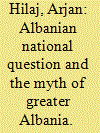

|
|
|
|
|
| Publication |
2013.
|
| Summary/Abstract |
To know what the Albanian National Question (ANQ) is, one should learn it not from what its neighbors, namely Serbia and Greece, have to say, but from a more direct and reliable source, the voice of the Albanians themselves. No nation is in a position in which it can express in a realistic way the needs, rights and aspirations of a different nation in the same way as an individual cannot be an exact representative for anyone but himself. For many years the Western countries used to rely on either Serbian or Greek lenses for the ANQ. In the late 1990s the U.S.-led intervention against Serbia over Kosovo on humanitarian grounds and the Albanian insurgency in Macedonia has contributed to an altered power balance in the region. The neighbors frightened by the power shift in the Southern Balkans use their propaganda machinery to express the danger posed by the alleged Greater Albania scheme in order to demonize and morally downgrade the ANQ. However, one can easily see that Albanians since the creation of their state have not, are not, and will not pursue an irredentist agenda toward their neighbors.
|
|
|
|
|
|
|
|
|
|
|
|
|
|
|
|
| 2 |
ID:
124356
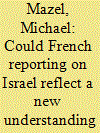

|
|
|
|
|
| Publication |
2012.
|
| Summary/Abstract |
The media in France show an inordinate interest in the Middle East and more specifically in the Palestinian issue and Israel. Not a day passes without a news item, an article, and several blog posts on the subject. Each year ushers in a new crop of essays on this topic, while other weighty matters, such as human rights in China or the neverending food crisis and endemic corruption in Africa get short shrift. The subject never fails to fascinate the public. Writing about the settlements or the blockade of Gaza will prompt hundreds of talkbacks, a fact well known to editors of websites such as Rue891, which rely heavily on advertising to survive.
|
|
|
|
|
|
|
|
|
|
|
|
|
|
|
|
| 3 |
ID:
124384
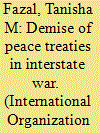

|
|
|
|
|
| Publication |
2013.
|
| Summary/Abstract |
The conclusion of peace treaties following war was a norm of international politics for millennia. Since approximately 1950, however, the rate at which interstate wars have ended with a formal peace treaty has declined dramatically. I argue that the costs of concluding peace treaties have risen with the development of the modern canon of the law of war. Using an original data set, I find that states today prefer to avoid admitting to a state of war and risk placing their leaders and soldiers at risk of punishment for any violations of the law of war.
|
|
|
|
|
|
|
|
|
|
|
|
|
|
|
|
| 4 |
ID:
124791
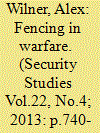

|
|
|
|
|
| Publication |
2013.
|
| Summary/Abstract |
New theoretical approaches have been developed that apply deterrence and coercion to counterterrorism. Critics have suggested, however, that in the particular case of deterring terrorism by threats of punishment, a mismatch exists between deterrent goals and counterterrorism intentions: the twin aims of destroying and deterring a single opponent is logically and theoretically incompatible. These criticisms, however, neglect to take two important factors into consideration. First, threats of punishment in counterterrorism can be applied against a wide assortment of actors involved in and associated with terrorism and political violence. Second, the concept of "intra-war deterrence" suggests ways in which a state can deter certain behavior or a specific form of warfare while engaging in open conflict with that same adversary. In exploring both factors, this article posits that states can gain coercive leverage over different actors involved in terrorism, including organizations with which they are actively hoping to defeat.
|
|
|
|
|
|
|
|
|
|
|
|
|
|
|
|
| 5 |
ID:
125342
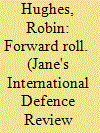

|
|
|
|
|
| Publication |
2013.
|
| Summary/Abstract |
beyond the experience of Iraq and Afghanistan, freedom of manoeuver and the associated requirement to detect, investigate, disrupt or neutralize concealed threat, will enduring across future conflicts.
|
|
|
|
|
|
|
|
|
|
|
|
|
|
|
|
| 6 |
ID:
124258
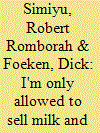

|
|
|
|
|
| Publication |
2013.
|
| Summary/Abstract |
This paper deals with the gender aspects of urban livestock keeping in Eldoret, Kenya. It shows that men and women play different but complementary roles in livestock keeping. Men show greater preference for and are more involved - in terms of decision-making and responsibility taking - with large livestock and where income is the primary motive for livestock keeping, and perform tasks of an outdoor nature and/or which require considerable technical knowledge. On the other hand, women prefer and exercise greater control over small livestock, make the most decisions about consumption use of livestock products, and perform home-based routine tasks. However, there are instances where men and women cross gender boundaries, for instance where labour of the opposite gender is absent in the household, or as a strategy to control benefits accruing to the livestock. In terms of livelihood outcomes, women's role in livestock keeping is geared more towards improving household nutritional and food security status, while men's role is motivated more by personal benefits.
|
|
|
|
|
|
|
|
|
|
|
|
|
|
|
|
| 7 |
ID:
124252
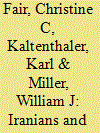

|
|
|
|
|
| Publication |
2013.
|
| Summary/Abstract |
A 2008 poll of Iranians revealed that approximately twenty-four percent of those surveyed support the development nuclear weapons by Iran, while seventy-four percent of those surveyed support the development of exclusively peaceful nuclear capabilities. This essay develops an argument that explains why Iranians hold different views on nuclear weapons. We contend that the elite discourse on the legitimacy of nuclear weapons within a nation will play a very large role in shaping public attitudes on the development of such weapons. In post-revolution Iran, ruling elites have invoked Islam to shape the discourse on nuclear weapons, and top clerics have argued that Islam forbids the development of such weapons. Thus we would expect that acceptance or rejection of this view of nuclear weapons will be the primary factor explaining an Iranian's support for or opposition to their development. Our regression analyses indicate that a respondent's views on whether Islam tolerates the development of nuclear weapons explain, in large measure, the observed variation in Iranian support for developing nuclear weapons.
|
|
|
|
|
|
|
|
|
|
|
|
|
|
|
|
| 8 |
ID:
125008
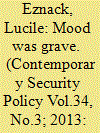

|
|
|
|
|
| Publication |
2013.
|
| Summary/Abstract |
Recent developments in international relations and international security scholarship emphasize the need to consider emotions in explaining interstate behaviour. Less work has been done exploring the difference between emotions - or emotional reactions - and the longer-term affective dispositions they can trigger, affecting foreign and security policy. Affective dispositions towards objects, it is argued here, provoke different emotional reactions towards events affecting this object, even though the observed emotions might be labelled the same. Hence, an interstate dispute will elicit different anger expressions and related behaviours if the countries concerned are friends (with positive affective dispositions) or enemies (with negative affective dispositions towards each other). This article shows that state behaviours that otherwise would seem inconsistent or contradictory are explained by their affective dispositions. Countries tend to be more restrained in their anger-related behaviours towards friends than towards enemies. The argument is illustrated by America's emotional reaction to the behaviour of Britain during the 1956 Suez crisis, compared to its reaction to the Soviet Union following the 1979-1980 invasion of Afghanistan. The emotional reactions in these cases are not specific to Washington. Other countries, such as the Czech Republic, France, Hungary, and Poland, displayed similar tendencies during the Iraq crisis of 2003, as did Britain, France, and Germany over intervention in Libya in 2011, in which anger and anger-related behaviours were influenced by the affective dispositions.
|
|
|
|
|
|
|
|
|
|
|
|
|
|
|
|
| 9 |
ID:
124189
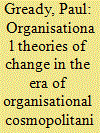

|
|
|
|
|
| Publication |
2013.
|
| Summary/Abstract |
This article argues that organisational cosmopolitanism is an increasingly common characteristic of international ngos. Cosmopolitanism goes beyond international staffing, to include multi-sectoral mandates, multiple skill sets and multiple levels of working. It also challenges the orthodoxies of its parent discourses. Change within such international ngos represents a new frontier in organisational change, as its ambit and ambition extends beyond the demands of more conventional intra-sectoral change. Using ActionAid as a case study, the article explores what might be gained by rendering explicit previously implicit theories of change within such a context. It focuses on inward looking, organisational change but also explores connections to outward looking, operational change. The article highlights two change-related concepts that are of relevance to cosmopolitan organisations: organisational archaeologies (implying layered, hybrid, evolutionary change) and cycles of misalignment followed by realignment. Lessons learned for cosmopolitan organisations from the ActionAid case study suggest that cycles of internal reflection and planning are an effective way of managing other aspects of change.
|
|
|
|
|
|
|
|
|
|
|
|
|
|
|
|
| 10 |
ID:
124433
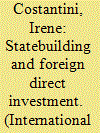

|
|
|
|
|
| Publication |
2013.
|
| Summary/Abstract |
Within the broader debate over the political economy of statebuilding, the role of foreign direct investment (FDI) in fragile and post-conflict settings is increasingly controversial but still understudied. This paper examines the tensions between the good governance agenda currently being implemented in Iraq and the investment dynamics occurring at the country's national and provincial levels. Drawing on disaggregated data, the paper argues that the flow of FDI is reinforcing destabilizing dynamics in Iraq by increasing levels of inequality, deepening the decentralization process, and undermining internal and external balances of power.
|
|
|
|
|
|
|
|
|
|
|
|
|
|
|
|
|
|
|
|
|